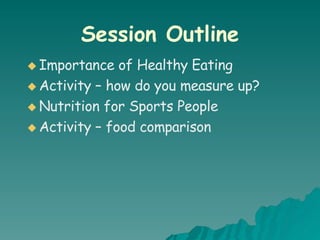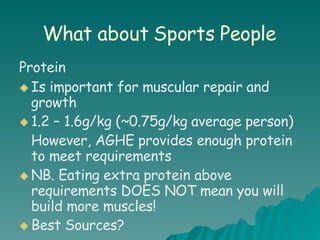Sports peoples nutrition
- 1. JSC â Astana medical university â Department of ââPhysical culture â Theme : Sports people nutrition. Done by : Sangeeta Yadav Group : 160
- 3. Session Outline ïĩ Importance of Healthy Eating ïĩ Activity â how do you measure up? ïĩ Nutrition for Sports People ïĩ Activity â food comparison
- 4. Why is Healthy Eating important for sport peoples?
- 5. ïĩ Everything you experience now will influence the rest of your life ïĩ Lots of things are happening to youâĶâĶ Body âĐ Growth, Sexual maturity, Body shape Ideas, Feelings about you, Friendships, Family relationships, Future plans?????? The food you eat now will have a strong influence on your health both NOW and in the FUTURE!
- 6. ïĩ Short term Improves: ï Energy ï Fitness ï Looks ï Well being ï Immunity ï Concentration ï Wt Control ïĩ Long term Reduce risk of developing; ï Anorexia Nervosa ï Bulimia Nervosa ï Dental Caries ï Lifestyle related health problems as Adults: ï Obesity ï Osteoporosis ï Cardiovascular Disease ï Type II Diabetes ï Some Cancers
- 7. Basis of a Healthy Diet BALANCE + MODERATION + VARIETY AND ENERGY IN = ENERGY OUT
- 9. Dietary Guidelines âEnjoy a wide variety of nutritious foodsâ ïĩ Cereals ïĩ Fruit ïĩ Vegetables, legumes ïĩ Lean meat, fish, poultry & alternatives ïĩ Milk, yoghurt, cheese ïĩ Extras
- 10. Important ïĩ By eating a wide variety of food, you are more likely to consume all the nutrients you need. NO SINGLE FOOD can provide you with all the nutrients necessary for good health!!
- 11. Important Nutrients Carbohydrates Main energy source can be sugars or starches. Best Sources: Wholegrain Breads & Cereals, fruit, legumes. Others: Jam, sugar, honey, sâdrink, lollies, cakes, (ïFat/ï sugar)
- 12. Important Nutrients Protein Growth, build & repair muscle & other body tissues. Best Sources: Lean meat, eggs, dairy, legumes and nuts.
- 13. Important Nutrients Fat Important for absorption of some vitamins, & growth, energy. 3 types: Saturated (BAD) Animal products such as meat, dairy, eggs, butter, coconut & palm oil. Poly & Mono-unsaturated (GOOD) Seeds, fish, margarine and most vegetable oils, avocado, olives, nuts.
- 14. Important Nutrients Water Helps excrete waste products. Minimum 2L per day. Best source: H2O Others Soft drinks, fruit juice, fresh fruit, cordial, sports drinks (cause dental caries). Avoid caffeinated fluids and alcohol- dehydrating
- 15. Important Nutrients Fibre Prevent constipation, prevent bowel cancer and heart disease, assists with weight control. Sources: Plant foods - fruit, vegetables, wholegrain breads and cereals
- 16. Important Nutrients Vitamins Vital to life. Necessary to build bones, teeth, and body tissues. Best Sources - Eating a WIDE VARIETY of foods from the 5 food groups.
- 17. Important Nutrients Minerals Vital to life. Especially important during growth. âŧCalcium - Strong bones/teeth, muscle contraction, nerve impulses, blood clotting. Best sources: Milk, Yoghurt, Cheese, Canned Fish (with bones). Others: some green vegies, soy beans & legumes. âŧIron - Healthy Blood to transport oxygen to your organs, cells, tissues so they can use energy you get from food. Best source: Animal products, especially lean red meat. Others: Other meats, green leafy vegies, wâgrain and fortified B & C.
- 18. Look at what you ate during the week Use the handouts to work out how your eating pattern compares to the AGHE. Are there any groups where you are; ïĩ over the recommended? ïĩ under the recommended?
- 19. What about Sports People A basic training diet should: ïĩ Provide energy and nutrients to meet demands of training ïĩ Include a wide variety of foods ïĩ Enable the athlete to achieve optimal body weight and fat levels for performance ïĩ Promote a quick and full recovery after exercise ïĩ Provide adequate fluids to ensure maximum hydration before, during and after exercise ïĩ Consider the short and long term health of the individual
- 20. What about Sports People ïĩ Depends on type of sport ïĩ Still need to have a balanced healthy diet to get vitamins and minerals (canât pig out on extras) Is very similar to that of the general public â just require more serves and better planning.
- 21. What about Sports People Carbohydrates ïĩ Serves as an energy fuel for the body, stored in liver and muscle tissue as glycogen ïĩ Is the most readily available fuel for exercise ïĩ A high carbohydrate diet and regular training promotes high glycogen stores and spares protein
- 22. What about Sports People ïĩ Depending on type of activity and training regime amount can vary from: â 5-7g/kg, <1hr mod intensity â 7-10g/kg, 1-3 hours mod-high intensity â 10-12g/kg, 5-6 hours mod-high intensity AGHE provides ~ 500g CHO at max servings. Therefore, people training at high level will need extra CHO foods. ïĩ Best Sources?
- 23. What about Sports People Protein ïĩ Is important for muscular repair and growth ïĩ 1.2 â 1.6g/kg (~0.75g/kg average person) However, AGHE provides enough protein to meet requirements ïĩ NB. Eating extra protein above requirements DOES NOT mean you will build more muscles! ïĩ Best Sources?
- 24. What about Sports People Water ïĩ ++, especially endurance ïĩ Consume before, during and after Vitamins and Minerals ïĩ Vitamin and minerals are required in many body functions and processes ïĩ A balanced diet usually ensures athletes meet vitamin and mineral needs. ïĩ ? If athletes need more than non-athletes
- 25. Food Comparison Group 1: Sedentary teenager Group 2: Teenage Sportsperson ïĩ Lay out foods on butchers paper according to requirements ïĩ Think about serve sizes (use booklet to help) ïĩ Whatâs the difference?
- 26. QUESTIONS?


























